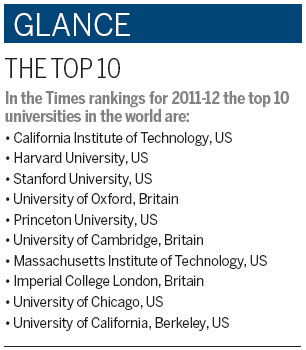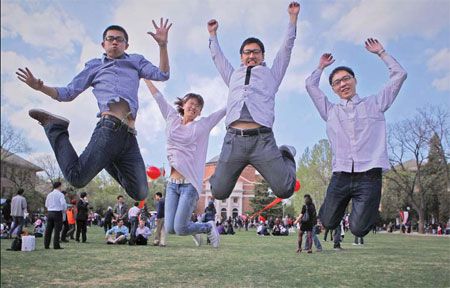But who makes the rules?
Updated: 2011-12-02 11:49
By Karl Wilson (China Daily European Weekly)
|
|||||||||
|
|
Few asian universities make the top order in world rankings
Look at any world university ranking and the same names, such as Harvard, Princeton and Stanford in the US; Oxford and Cambridge in Britain keep popping up.
They are the elite of the elite and you have to go a long way down the list before you find a university from Asia.
However, with countries such as China, Japan, South Korea and Singapore, the leading economies of Asia, investing more in higher education experts hope universities from this region will give universities in the US and Britain a run for their money and rise up the world rankings in the future.
In the UK-based Times Higher Education World University Rankings, Japan has five universities, Hong Kong has four, the Chinese mainland three, South Korea three, Singapore three, and Taiwan has one.
"Our top 200 list represents only about 1 percent of the world's universities, so to be in the 200 is in itself an excellent achievement," says Phil Baty, editor of the Times Higher Education Magazine which has been publishing the global university rankings for the past eight years.
"It is quite a strong showing, and it demonstrates that Asia has many universities that are truly among the very best of the world's research elite. Some are among the elite of the elite, with the University of Tokyo at 30, Hong Kong University 34 and the National University of Singapore at 40," he tells China Daily.
"It is clear ... that Asian nations are well ahead when it comes to literacy, numeracy and scientific competence among school-age children (15-year olds). This, combined with growing private (family) and public (State) investment in universities in Asia, alongside growing economic strength, may see the balance of power in higher education shift in the future."
Critics, however, say the current ranking system betrays a bias toward the ruling elite in the West.
According to a Malaysian academic, rankings are a "Western construct" and they are designed for the Western world to evaluate themselves.
"How can you compare Harvard with a university from a developing country? How do you judge a good university? By the number of academic papers written in English? Do they promote better education or do they simply promote an elitist, Western system?" Professor Dzulkifli Abdul Razak, vice-chancellor of the Al Bukhary International University in Penang, Malaysia, rolls out a series of questions.
Higher education, he says, has turned into a business in many parts of the world. "They pay big money for academics. How can universities in the developing world compete in salary terms with the likes of Princeton? Universities are not football clubs based on a couple of stars."
With higher education now a multi-billion dollar business, especially in many countries in Europe and the US, it is not hard to see why universities want to appear on those rankings. The higher you are in the rankings the easier it is to market your university and its programs and attract foreign students willing to pay high fees.
Every year dozens of companies publish their lists of the world's top universities compiling masses of data - data provided free of charge by the universities - as they go.
One critic of the ranking system recently described them as "a high-stakes beauty contest".
At a recent forum organized by UNESCO, the Institutional Management of Higher Education and the World Bank, universities, especially those in developing countries, were told to avoid trying to "keep up with the Joneses".
"Instead of trying to conform to the prevailing mono-culture approach to higher education by funnelling scarce public funds to create flagship universities, governments should ignore rankings altogether," the forum was told.
Sandro Calvani of the Asian Institute of Technology (AIT) in Bangkok agrees.
"Asian universities manage knowledge on Asia better than the West and they do it in a way the West cannot see or does not wish to see," says the education expert and director of the ASEAN Regional Center of Excellence on Millennium Development Goals at the AIT.
In his view, many Western elite universities lack Asian expertise on sustainable development, global public good and human security concerns.
According to another Malaysian academic, comparing Asian universities with Harvard is neither relevant nor helpful.
"Universities have their own, unique role to play within a society. Comparing them to universities from a different environment and political system is not fair," says the academic, who does not want to be named.
Very few universities in developing countries on the other hand "can ever afford to compete with the finances available to these super-elite universities, to avail themselves of the world's who's-who of intellectual talent, and to pick and choose from what is considered as cutting-edge research," Calvani wrote in a report.
"For these globally-focused universities possessing similar resources and orientation, uniform rankings are probably useful. Indeed, arguing the relative merits of the scholarship at Cambridge, Massachusetts versus Cambridge, England is a fair debate, and even a fun pursuit," Calvani says.
However, Baty of Times Higher Education insists its rankings are balanced and treat countries with different higher education systems and cultures as fairly as possible.
"We look at a certain type of globally competitive, research-intensive university in our rankings, and it is true that the US dominates," he says.
Critics, however, wonder why the lists are dominated by US and British universities.
"Does no one else find it unusual that the top-ranked universities in the English-language publication (Times) are all in English-speaking countries?" one blogged recently.
Asia does well, too, says Baty, even though he admits that the list tends to be dominated by English-language journals. "Asian institutions are treated fairly."
He adds that the list includes journals from other regions. "This year we examined more than 50 million citations to around six million articles published over five years, with journals drawn from the Thomson Reuters database."
The elite US research universities, Baty says, have benefited from major investment in recent decades, and often enjoy very large bursaries, generous alumni donations, and they can command very large student tuition fees.
Professor Tan Eng Chye, deputy president for academic affairs and Provost of the National University of Singapore also defends the ranking system saying it provides "useful composite indicators" on a university's performance.
"The strong showings by European and US universities reflect traditional strengths of those university systems embedded in the general historical context of Europe or the US. However, methodological constraints inherent in some rankings may favor some institutions over others," Professor Tan tells China Daily.
He says the Times ranking "gives significant weight to a university's reputation in teaching (15 percent) and research (18 percent), and this may favor older and more established universities - which are predominantly in Europe and US - that are more internationally renowned."
 |












